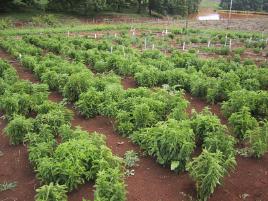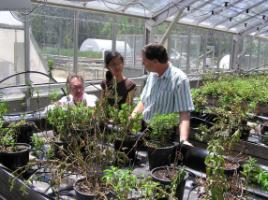Uni wins approval for new natural sweetener
Published on 11 April, 2010
After almost a decade of research and 4 years of submissions, CQUniversity's efforts have paid off with approval of the natural sweetener steviol glycosides (stevia), as an ingredient in foods and beverages in Australia and New Zealand...
The Australian food authority FSANZ has approved the use of the natural sweetener and this will be gazetted today (October 9). There has been national and overseas media coverage about the potential benefits.
The initial application and submissions were made by CQUniversity's Centre for Plant & Water Science on behalf of all consumers, users and potential stevia growers.
Professor David Midmore explained the University had made the application because stevia was recognised as a potential new high-value crop for farmers.
He has been working on stevia for almost a decade in conjunction with the University's Honorary Fellow and research officer Andrew Rank.
"Stevia is not a new invention and thus no company holds a patent and would go to the expense of approval just to let other companies cash in on their approval," Professor Midmore said.
Uni team studies stevia health benefits - LINK to details
Steviol glycosides - the extract of the leaves of the plant Stevia rebaudiana - are a group of intense sweeteners (250 times sweeter than sugar) which can be used in any food or drink that now contains sugar.
Initially it is likely to replace existing chemical sweeteners, especially in ‘diet' drinks.

A stevia crop
Professor Midmore said the approval process confirmed the complete safety of stevia; it has passed every conceivable test for safety.
"CQUniversity believes that it will make an important contribution in low-calorie drinks. For example, one litre of sugar-sweetened soft drink contains at least 1700kJ of energy, whereas when sweetened with stevia the energy content will be as low as 7 kJ," he said.
"We see stevia becoming a significant tool/ingredient for community use in the fight against obesity and the associated metabolic syndrome and diabetes (type II).
"This ‘calorie free' sweetener is completely safe for use by all consumers including diabetics as shown in hundreds of trials carried out in many countries. The results from these trials were a key factor in the approval by FSANZ. The safety is also confirmed by experience in Japan where it has been used by a population of 90 million people for 35 years without a single adverse effect ever being reported or suspected."
Professor Midmore said stevia will be readily accepted by food and drink manufacturers because it is safe, natural and should cost less than sugar.
It is expected to be used first in drinks - soft drinks, cordials, milk drinks and juices. It is also expected to be used to make reduced sugar (or diet/low joule) products in ice-creams, yoghurts, breakfast cereals, biscuits, confectionary etc. These are the very food products often consumed to excess and responsible for the development of obesity, especially in adolescents
Stevia does not taste like white sugar and will be a new taste experience for consumers; it has a characteristic taste somewhere between licorice and treacle.
Professor Midmore said stevia is an exciting new product which should be a winner for everyone:-
- - A safe low-calorie sweetener which could enable many mainstream products to be suitable for all diabetics.
- - A sweetener that is not bad, but good, for your teeth and general health.
- - One that can be used by the organic food industry.
- - A new high-value crop for irrigation farmers that has a very mild/low environmental footprint - low or no chemical use and low fertilizer needs.
"We welcome this approval and assure consumers that this will be a safe and valuable addition to food ingredients - look for it as stevia, steviol glycosides or as ingredient number 960," Professor Midmore said.
He acknowledged support from the Rural Industries Research Development Corporation (RIRDC) and Federal Member for Capricornia Kirsten Livermore.
Ms Livermore congratulated Professor Midmore and CQUniversity on gaining approval for the use of steviol glycosides in food and beverages, after years of persistent work.
"I've been delighted to be able to help them in their approach to FSANZ to get these approvals granted," Ms Livermore said.
"An exciting project like this has the potential to be a real win for the people of Central Queensland and for farmers looking to diversify their operations."
More details via: http://www.foodstandards.gov.au/_srcfiles/FAR_A540_Steviol_glycosides.pdf



